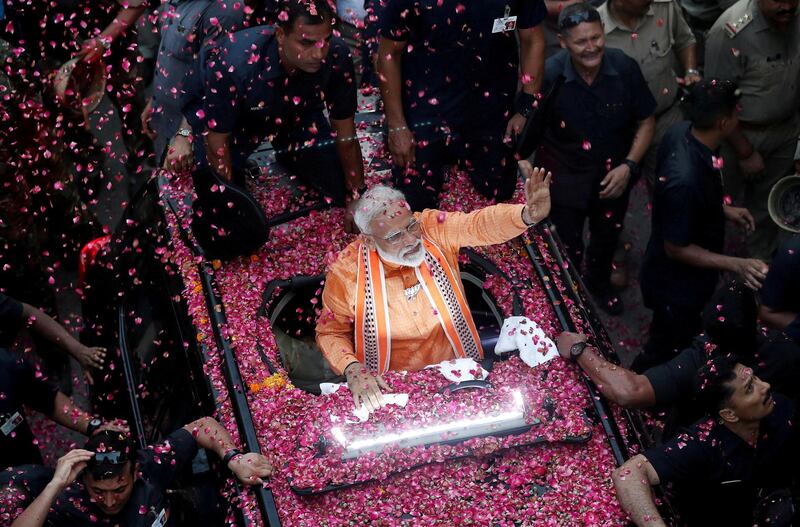The results of India's general election – a massive, seven-phase exercise that ran from April 11 to May 19 – will be announced late on Thursday, but until then, the chatter is all about the exit polls. They came thick and fast after the last votes were cast, triggering paroxysms of delight in Prime Minister Narendra Modi's Bharatiya Janata Party (BJP) and its allies. Social media also lit up with dozens of barbed memes and trenchant takedowns of the opposition by Modi supporters.
At least seven exit polls have predicted victory for the BJP-led National Democratic Alliance (NDA). They vary only in the margin of triumph they forecast. The most conservative estimate pegged the NDA tally at 242 of the 545 seats in the lower house of parliament. The most bullish gave it 365. An average of all exit polls gives the NDA 295 seats, which is comfortably past the 272 needed to secure a parliamentary majority and form a government.
Believing Mr Modi to be headed for a second term, his jubilant supporters have veered into extraordinary realms. One even made a connection between the realities of Indian politics and the fantasy world of Game of Thrones. He linked the television series' epic final episode, which also aired on May 19, when the last votes were cast in India, with the predicted defeat of Rahul Gandhi's main opposition Congress Party. Mr Modi's follower tweeted a photograph of Mr Gandhi, who belongs to a political dynasty of three prime ministers, alongside Daenerys Targaryen, whose parents were ousted from the fictional Iron Throne of Westeros. "Just because your ancestors sat on the throne, doesn't mean you'll too. #GOTFinale," the Modi supporter said to Mr Gandhi, via Daenerys.
In any event, it was a savage, almost brutal swipe at the Indian opposition leader. But it could be said to exemplify the tone of the election season just ended.
The weeks-long campaign was marked by name-calling, sexist attacks on female candidates and praise for the assassin of Mahatma Gandhi, who led India's struggle for independence from British rule. There was also calumny against the dead, notably Mr Gandhi's assassinated father Rajiv, with Mr Modi derisively describing the late Congress prime minister as "bhrashtachari (corrupt) No 1".
Congress politicians heaped abuse on Mr Modi too. Mr Gandhi called him a “chor” or thief – a reference to alleged corruption in a defence deal on Mr Modi’s watch. Another Congress member said Mr Modi was a "modern-day Aurangzeb" because he had demolished temples in the holy Hindu city of Varanasi in the name of tourist and development corridors. The Mughal emperor Aurangzeb evokes strong reactions in India and is reviled for religious intolerance and the destruction of Hindu temples.
Now that the election process has ended, the exit polls are filling the void as India and the world waits for the final results. Mr Modi’s well-wishers have been jocular – and cruel – about the opposition’s presumably crushing sense of dismay after the exit polls. “Rumour out that Rahul Gandhi demanding a recount of exit polls,” mused a prominent supporter based in the UK, seeming to suggest the opposition was both desperate and led by a man with a brain-bypass.
Much of the humour and victor’s euphoria rest on the polls, but how credible are they really? Generally, Indian exit poll predictions get the trends – if not the detail – right. In 2014, Mr Modi’s first election as the BJP’s prime ministerial candidate, most exit polls accurately predicted an NDA win, but few said the BJP would secure an absolute majority on its own. In 2009, the Congress-led governing alliance won more seats than forecast by the exit polls. But, in 2004, they predicted a comfortable victory for the NDA, only for Congress to emerge as the single largest party.
Accordingly, there is always the possibility the 2019 exit polls could be wrong, but hardly anyone outside the professional political opposition is saying so right now. This is largely because of a gut feeling that the opposition has not run strongly enough against Mr Modi and the BJP. Indeed, there is a dismal sense the exit polls may be right about a BJP win, albeit by a smaller margin than forecast.
If so, what it will mean for India is simply put: a second Modi term would be bolder, more self-assured, more Hindu nationalist and more exclusivist. And it may change the idea of India as a secular democracy decisively and beyond retrieval.





